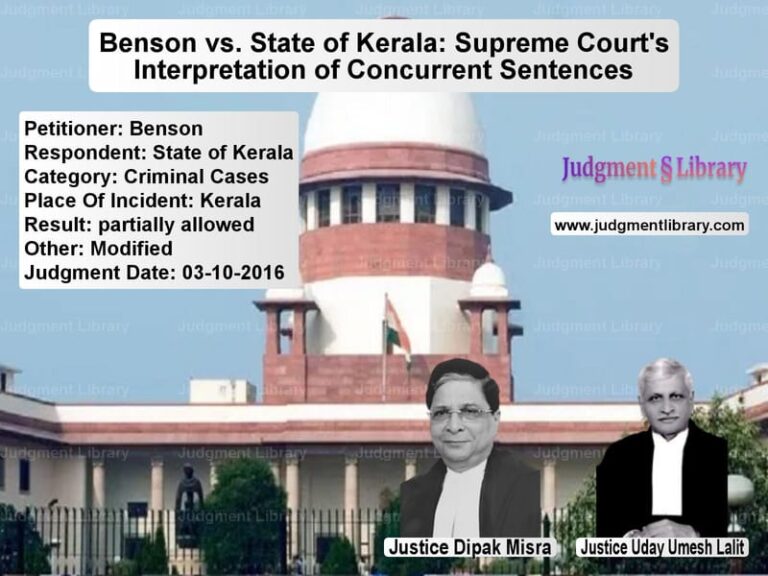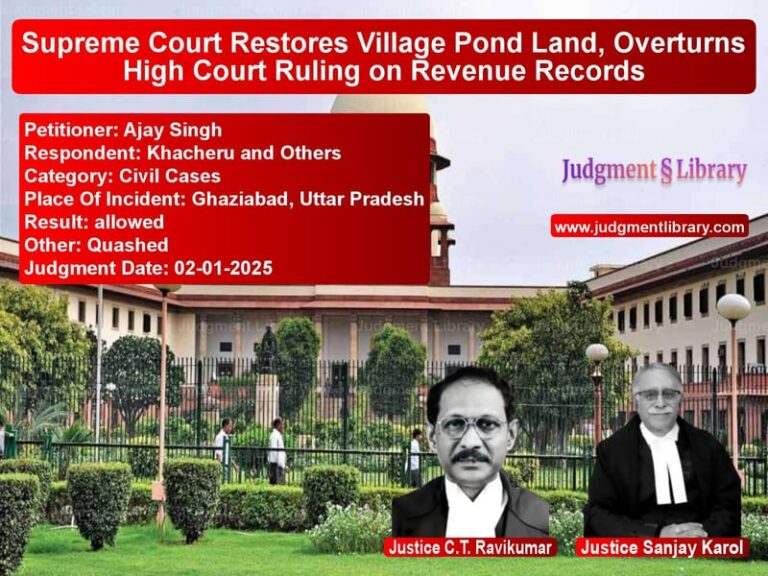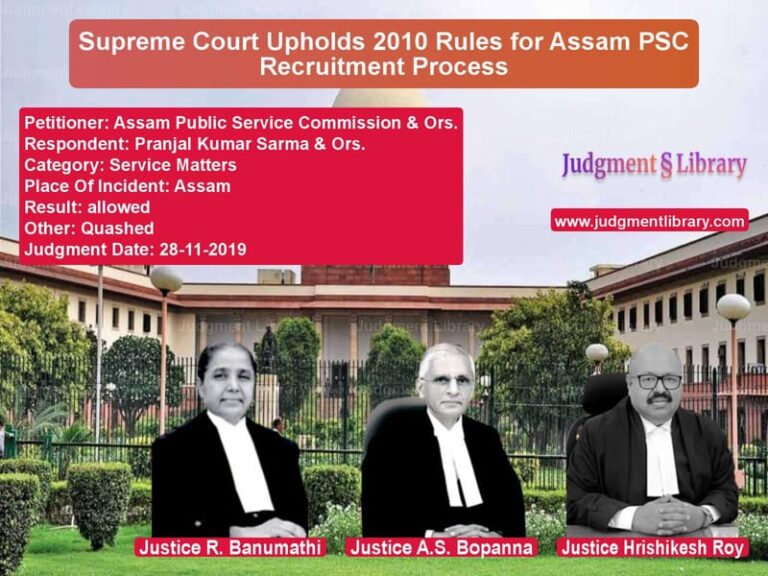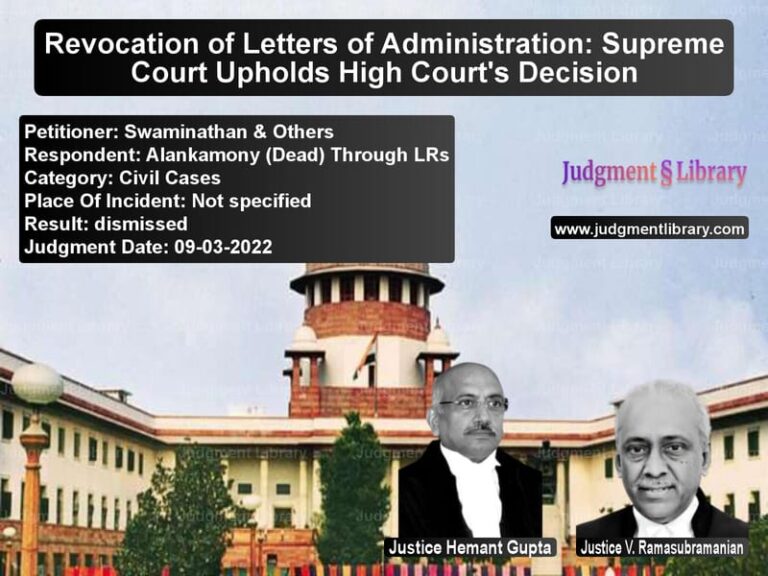Chhattisgarh Rent Control Act Challenged: Supreme Court Strikes Down Direct Appeal Provision
The case of Rajendra Diwan vs. Pradeep Kumar Ranibala & Anr. is a landmark decision concerning the legislative competence of state governments in enacting rent control laws. The Supreme Court was called upon to decide whether Section 13(2) of the Chhattisgarh Rent Control Act, 2011, which provided for a direct appeal to the Supreme Court from the Rent Control Tribunal, was constitutionally valid.
Background of the Case
The appellant, Rajendra Diwan, was a tenant who had been ordered to vacate the premises by the Rent Control Tribunal in Raipur, following an eviction order by the Rent Control Authority. He filed an appeal in the Supreme Court under Section 13(2) of the Chhattisgarh Rent Control Act, which provided a statutory right to appeal directly to the Supreme Court from the Tribunal’s decision.
The key issue in this case was whether the Chhattisgarh State Legislature had the authority to provide for a statutory appeal directly to the Supreme Court, bypassing the High Court, under the constitutional scheme of distribution of powers.
Key Issues in the Case
The Supreme Court had to examine:
- Whether the Chhattisgarh Legislature had the power to confer appellate jurisdiction on the Supreme Court.
- Whether Section 13(2) of the Chhattisgarh Rent Control Act, 2011, violated the constitutional scheme.
- Whether the provision conflicted with Article 136 of the Constitution, which provides the Supreme Court discretionary power to grant special leave to appeal.
- Whether Presidential assent under Article 200 validated the provision.
Arguments by the Appellant (Tenant)
The appellant argued:
- That Section 13(2) was constitutionally valid as it did not create new jurisdiction for the Supreme Court but merely extended its appellate power.
- The provision was protected under Article 138(2), which allows Parliament to extend the jurisdiction of the Supreme Court.
- The Act had received Presidential assent under Article 200, making it immune to challenge.
- The appeal process under the Act was in line with the legislative power of the state under Entry 18 of the State List (Land and Tenancy Laws).
Arguments by the Respondents (Landlord and Government)
The respondents countered:
- That only Parliament had the power to determine the jurisdiction of the Supreme Court under Entry 77 of the Union List.
- The State Legislature lacked the competence to provide a statutory appeal to the Supreme Court, as this was beyond its legislative domain.
- That the existence of Article 136, which gives the Supreme Court discretionary powers, meant that no law could impose a mandatory appellate jurisdiction.
- The Presidential assent under Article 200 could not override constitutional limitations on legislative competence.
Supreme Court’s Observations and Ruling
The Supreme Court, comprising Arun Mishra, Indira Banerjee, Vineet Saran, M.R. Shah, and S. Ravindra Bhat, delivered a comprehensive ruling, striking down Section 13(2) of the Act.
1. State Legislature Lacked Competence
The Court observed:
“The jurisdiction of the Supreme Court is exclusively within the domain of Parliament under Entry 77 of List I. The State Legislature has no power to legislate on matters affecting the Supreme Court’s jurisdiction.”
It was held that the State List (Entry 18) allowed the State Legislature to regulate tenancy matters but not to interfere with the appellate structure of the Supreme Court.
2. Violation of Constitutional Scheme
The Court emphasized that Article 136 grants discretionary appellate powers to the Supreme Court, which cannot be overridden by a state law. It observed:
“The power of appeal to this Court cannot be mandated by a state enactment. The discretion of this Court under Article 136 cannot be converted into a statutory right.”
3. Presidential Assent Under Article 200 is Not Absolute
The Supreme Court clarified that while Presidential assent can validate a law repugnant to a prior Central law, it cannot validate a law beyond the legislative competence of the State Legislature. The Court held:
“Presidential assent does not grant legislative competence where it does not exist. The State Legislature cannot confer appellate jurisdiction on this Court simply because the Bill received Presidential assent.”
4. Violation of Federal Structure
The Court reaffirmed the principle that the Supreme Court’s jurisdiction cannot be diluted or expanded by state legislation. It reiterated:
“Only Parliament, under Article 138, can extend the jurisdiction of the Supreme Court. The power to regulate its appellate jurisdiction rests exclusively with Parliament.”
Final Judgment
The Supreme Court declared Section 13(2) of the Chhattisgarh Rent Control Act ultra vires the Constitution and struck it down:
“Section 13(2) is unconstitutional, null, and void as it is beyond the legislative competence of the State Legislature. The appeal is dismissed.”
Implications of the Judgment
This decision has far-reaching implications:
- State Legislatures Cannot Expand Supreme Court’s Jurisdiction: The ruling affirms that only Parliament can regulate the jurisdiction of the Supreme Court.
- Article 136 Remains Supreme: The discretionary appellate jurisdiction of the Supreme Court cannot be turned into a statutory right.
- Presidential Assent Does Not Validate Legislative Incompetence: Even if a law receives Presidential assent, it can still be struck down if it is beyond the legislative power of the state.
- Ensuring Legislative Discipline: The judgment reinforces the principle that state laws must comply with constitutional limits.
Conclusion
The Supreme Court’s ruling in Rajendra Diwan vs. Pradeep Kumar Ranibala & Anr. ensures that state governments do not exceed their legislative competence. By striking down an unconstitutional provision, the Court has reaffirmed the supremacy of the constitutional framework in determining the jurisdiction of the apex court. The judgment safeguards the balance of powers between Parliament and State Legislatures, ensuring judicial discipline and federal integrity.
Petitioner Name: Rajendra Diwan.Respondent Name: Pradeep Kumar Ranibala & Anr..Judgment By: Justice Arun Mishra, Justice Indira Banerjee, Justice Vineet Saran, Justice M.R. Shah, Justice S. Ravindra Bhat.Place Of Incident: Chhattisgarh.Judgment Date: 10-12-2019.
Don’t miss out on the full details! Download the complete judgment in PDF format below and gain valuable insights instantly!
Download Judgment: Rajendra Diwan vs Pradeep Kumar Raniba Supreme Court of India Judgment Dated 10-12-2019.pdf
Direct Downlaod Judgment: Direct downlaod this Judgment
See all petitions in Fundamental Rights
See all petitions in Constitution Interpretation
See all petitions in Public Interest Litigation
See all petitions in Judgment by Arun Mishra
See all petitions in Judgment by Indira Banerjee
See all petitions in Judgment by Vineet Saran
See all petitions in Judgment by Mukeshkumar Rasikbhai Shah
See all petitions in Judgment by S Ravindra Bhat
See all petitions in dismissed
See all petitions in Declared Infructuous
See all petitions in supreme court of India judgments December 2019
See all petitions in 2019 judgments
See all posts in Constitutional Cases Category
See all allowed petitions in Constitutional Cases Category
See all Dismissed petitions in Constitutional Cases Category
See all partially allowed petitions in Constitutional Cases Category







